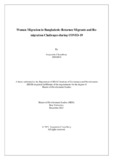Women migration in Bangladesh: returnee migrants and re-migration challenges during COVID-19

View/Open
Date
2021-12Publisher
Brac UniversityAuthor
Chowdhury, SoujannitaMetadata
Show full item recordAbstract
In Bangladesh, women mostly migrate as unskilled domestic worker and a small number of semi-skilled and skilled women workers migrate to other work sectors. Unskilled migrant workers face vulnerability during any crisis as they face information constraints and a lack of other services in their workplace and in the home country as well. During COVID-19, many migrant workers were forced by their host countries to return to Bangladesh and many came to visit their family with an intention to return. However, while most of the female migrants were eager to go back or re-migrate to a new place due to the economic difficulties faced in their home country, some did not want to migrate and wanted to stay in Bangladesh no matter how much struggle they were doing in here. While there were reasons behind such decision, women who wanted to return to their workplace and re-migrate, faced many difficulties during COVID-19 pandemic. This study attempted to explore diverse experiences and obstacles women migrants go through during their re-migration journey and how COVID-19 induced restrictions have added various dimensions of difficulties to that. This also examines why the highest portion of income as remittance sending group of Bangladesh go through such a situation and the deep-rooted cause behind their suffering. The question why and how women migrant workers are facing difficulties regarding their re-migration are addressed in the study. This study followed a qualitative method and used in-depth interview and key-informant interview methods to gather primary data. Data were analyzed through building themes and identifying patterns in their responses. The study finds that, knowledge gap regarding recruitment process, involvement of various recruitment actors, law and policy implementation gap as the most prominent theme that make re--migration difficult for women migrants and along with these issues, COVID-19 pandemic has created numerous difficulties like visa expiration, cancelation of flight, vaccination problem, financial difficulties for quarantine, passport renewal difficulties and so on. Despite the government taking various measures during the pandemic to send back the remittance earners, most of the women migrants were unaware of various information related to their return and rely on their local agents mostly. Moreover, the findings were analyzed in light of laws and policies taken by GoB and gender lens and found out that along with their gender identity as a women and their social class as an unskilled migrant worker, the loopholes in proper policy implementation creates different modes of discrimination and obstacles in their re-migration.
